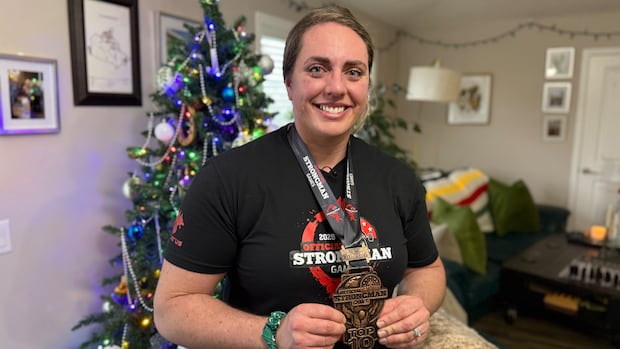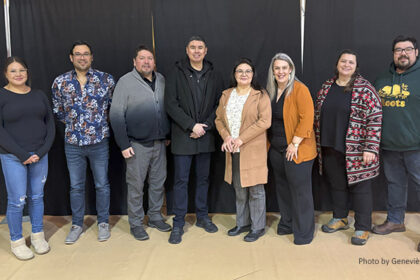Saskatchewan33-year-old Martensville woman Jackie Osczevski placed 3rd at the Official Strongman Games World Championships. She moved up in the standings after a trans woman was disqualified from first place.Jackie Osczevski of Martensville moved up to third place, but says it ‘kind of feels a little bit empty’Listen to this articleEstimated 4 minutesThe audio version of this article is generated by text-to-speech, a technology based on artificial intelligence.Jackie Osczevski was named the third-strongest woman in the world after the Official Strongman Games World Championships in Arlington, Texas. (Travis Reddaway CBC)Heading into last weekend, Jackie Osczevski knew it would be tougher than normal to carry a 550-pound timber frame, not to mention lifting a 225-pound log over her head.The 33-year-old from Martensville was fighting a cold, and fighting to hold onto her second place spot at the Official Strongman Games World Championships in Arlington, Texas Nov. 20-23, which included more than 400 athletes from 40 different countries.So Osczevski was disappointed when she dropped two spots from last year’s competition, coming in fourth, but figured her cold, and an impressive newcomer who took first place, factored into her standings.Jackie Osczevski initially placed fourth at the strongman competition. (Jackie Osczevski )It turns out both were true.“I was pretty defeated. I wanted to hold onto my second-place title,” Osczevski said after arriving back home in Martensville this week.But shortly after the competition wrapped last weekend, she learned that she would be moved up to third place.That’s because the person who won first place — a trans woman — didn’t let organizers know she was a male at birth, which was against the regulations to enter the women’s open category.Osczevski said it’s unclear to her why the athlete was entered in the women’s open category, which specified that only athletes registered as female at birth were eligible. A representative from the Official Strongman Games did not respond to requests for an interview, but did make a Facebook post about the situation.”Had we been aware, or had this been declared at any point before or during the competition, this athlete would not have been permitted to compete in the Woman’s Open category,” the post stated.Osczevski said the strongman competitions make a point of including categories for trans athletes, and described the sport as inclusive and welcoming to all genders. “We actually do have an open persons category. So we’re a very welcoming sport. We welcome everyone. We don’t discriminate.”Osczevski can deadlift 495 pounds. While that number is impressive — and incomprehensible for most people — it’s still about 300 pounds less than her male competitors lift.“I’m not as strong as a man,” she said.“Women work their whole lives to get this title.”Osczevski said moving up one spot to a third-place finish is nice, but it’s not the way she wanted to earn her place on the podium.”It kind of feels a little bit empty.”Trans advocates say sports need to be more inclusiveFae Johnstone, executive director of Queer Momentum, said the inclusion of open categories for trans athletes is a good step, but she worries it could further marginalize people.”I worry that’s going to take the five (trans) people in the sport and push them into a corner where they play only against each other.”Johnstone used to play boys hockey as a youth, but found the sport wasn’t inclusive once she came out as gay and transitioned to a woman.”We need to figure this out when it comes to sport, but it shouldn’t be a politicized issue. It should be left up to those who have expertise,” she said.For her, that means sports organizations need to develop evidence-based regulations in consultation with biologists and bio-ethicists as well as the medical community.Claire Carter, a professor in the department of gender, religion and critical studies at the University of Regina, said sport is doing a poor job of embracing trans athletes.“There’s other ways that we can organize sports that can be more inclusive.”She said efforts to create open categories that pit trans athletes against each other and maybe a few other people in the sport aren’t necessarily the answer.“How many trans athletes are we talking about? Are people competing in their own category individually?“There’s this idea that there’s this huge mass of trans athletes that are coming in and dominating, when actually that’s not the case.”ABOUT THE AUTHORColleen Silverthorn is a journalist for CBC in Regina. Colleen comes from the newspaper world, where she primarily covered politics and business. She has worked in Saskatoon, Regina and London, England. Story ideas? Email colleen.silverthorn@cbc.ca
Sask. woman medals in international strongman competition after trans athlete disqualified











